- Author Jason Gerald gerald@how-what-advice.com.
- Public 2023-12-16 10:50.
- Last modified 2025-06-01 06:05.
Sleep is very important for health. Getting a good night's sleep is also important if you want to look beautiful because you will naturally be more attractive if you get enough rest. So, try to make some simple changes to your routine to help improve your sleep. There are some simple steps you can take to get the maximum benefit.
Step
Part 1 of 5: Benefit for Beauty
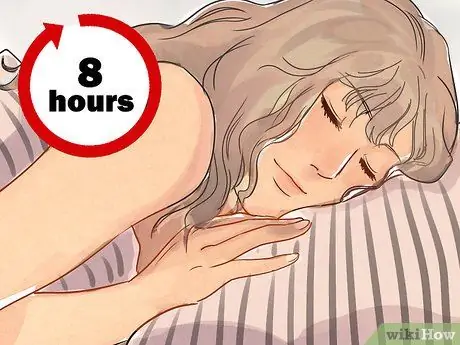
Step 1. Try to get eight hours of sleep
If you get seven to eight hours of sleep every night, you'll begin to experience the benefits of a beautiful sleep without having to do anything else! Adequate sleep helps prevent wrinkles and inflammation, stimulates muscle development, and inhibits fat production.

Step 2. Wash your face
Make sure you clean your face before going to bed. Dirt and adhering makeup can clog pores and cause breakouts.
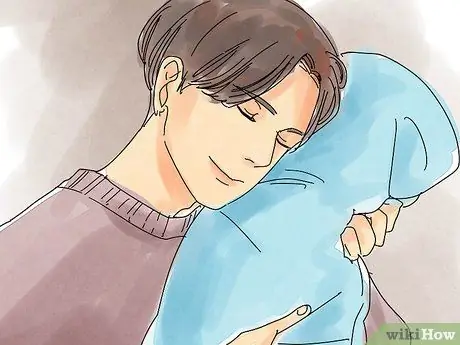
Step 3. Choose the right pillowcase
Sleeping on a satin or silk pillowcase can help prevent wrinkling and damage to your hair.
- Pillowcases need to be changed frequently because over time it will collect dirt and oil that causes pore clogging.
- If you want to maximize the wrinkle-preventing effect, sleep on your back so your face doesn't touch the pillow.

Step 4. Apply moisturizer
Skin rejuvenates itself while you sleep. Give a boost to skin rejuvenation by providing plenty of moisturizer before bed. Try a mask instead of a lotion or cream for added moisture.
Part 2 of 5: Changing Your Lifestyle

Step 1. Avoid caffeine
A cup of coffee or tea in the afternoon can make people unable to sleep. So, try not to drink drinks containing caffeine after lunch.
- Be aware of hidden sources of caffeine. There are some medications that also contain caffeine, especially diet pills.
- Try not to consume more than 400 mg of caffeine per day, regardless of what time you take it. This amount is equivalent to four cups of coffee.

Step 2. Avoid alcohol
Although alcohol can cause drowsiness, the effect is short-lived and the person who drinks it will wake up several hours later, unable to sleep again. Alcohol also doesn't allow you to enter deep sleep.
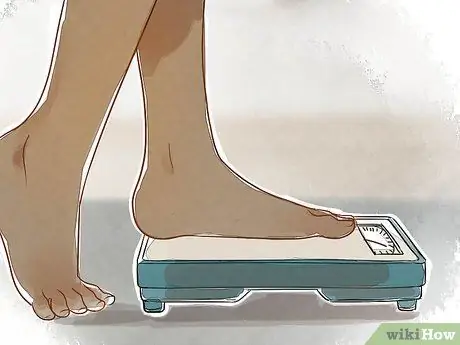
Step 3. Take care of your weight
Being overweight can increase the risk of sleep apnea which makes it impossible to sleep well.
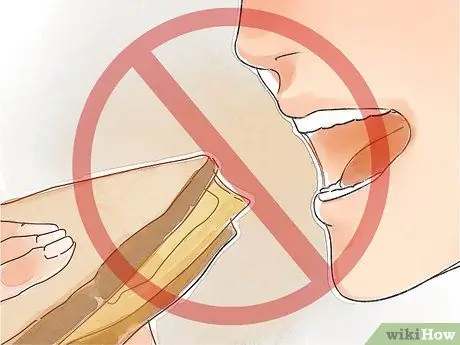
Step 4. Avoid foods that are sensitive to you
Dairy and wheat products are the ones that most often affect sleep because they cause several problems, such as making the stomach feel full, disturbing digestion, and causing excess gas.

Step 5. Exercise regularly
At least 30 minutes of exercise every day can help you sleep when the time comes.
- If you can't exercise 30 minutes at a time, try to do 10 minutes in the morning, 10 minutes in the afternoon, and 10 minutes in the evening.
- Exercising too close to bedtime can cause difficulty falling asleep. If this is the case, try to relax a few hours between exercise and bedtime.
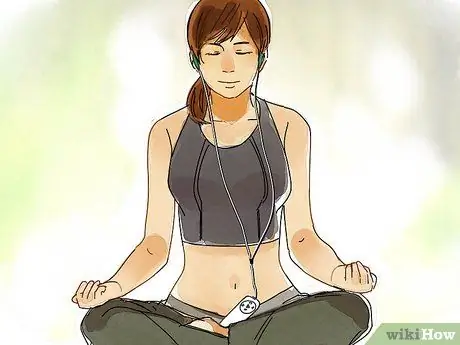
Step 6. Reduce stress
There are many reasons that stress is unhealthy, and one of them is that it interferes with sleep. If you can't sleep because you're worried about what's going on in your life, you really need to take steps to reduce stress.
- When stressed, generate positive thoughts and learn to laugh.
- There are many people who release stress with meditation, exercise, and deep breathing. Give it a try and see if it works for you.
- Try to get your life in order and make a rough plan for the next day before going to bed today so you don't have to think about it again when you're in bed.

Step 7. Enjoy the sun during the day
The more you are exposed to natural light during the day, the more in tune you will be with your body's natural circadian rhythm, and it can help you sleep at night.
Even if you don't go out, try sitting by the window

Step 8. Try not to take a nap
If you have trouble sleeping at night, napping will only make the problem worse, so try not to give in to sleepiness until it's time to sleep at night.
If you have to take a nap, do it as early as possible
Part 3 of 5: Obeying a Bedtime Routine
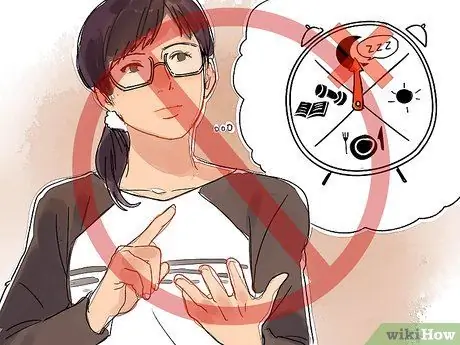
Step 1. Don't change your bedtime
You should go to bed and wake up at the same time every day, even on weekends. The goal is to get your body used to the rhythm of sleep and make it easier for you to fall asleep and wake up in the morning.
Sleeping late, even on weekends, is not healthy for your body because you will have a harder time falling asleep that night. Your body has gotten the sleep it needs because you woke up late, and will refuse to go back to sleep

Step 2. Eat the right foods
To improve sleep quality, try eating a carbohydrate-rich snack right before bed. Other options include warm milk, herbal teas, and foods high in tryptophan, such as yogurt and tuna.
Don't overeat, or you won't be able to sleep because of digestive upset

Step 3. Watch your fluid intake
Avoiding drinking an hour before bed will reduce the chances of waking up at night to go to the bathroom, or at least minimize the frequency.
Try to go to the bathroom right before bed to increase the chances of sleeping without being disturbed

Step 4. Don't watch TV right before bed
Television overstimulates the brain and for some people, exposure to light also makes it difficult to sleep.
- Avoid other screens like phones and tablets.
- If you must watch television before bed, not in the bedroom. Try to make your room a special place to sleep.
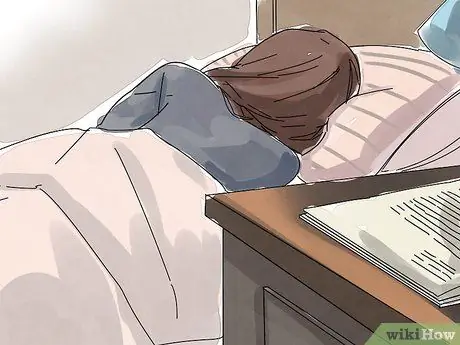
Step 5. Put your work aside
Try to stop working at least an hour (but preferably two hours or more) before bed. This will give your mind time to relax so you can go to bed feeling calm, less excited or anxious about tomorrow's deadline.
Try not to go to bed later than usual when you are working or studying. Instead, try to plan ahead so you have time to study or work early

Step 6. Do something relaxing before bed
Instead of watching television or working, choose activities that will help you relax after a long day. The key is to find something that relaxes you, then repeat it every night to help release the tension of the day.
- Read a fun, slow-paced book. Try to avoid books that are stressful because you may be reading for hours instead of sleeping. So that your sleep schedule is not disturbed, read a printed book or choose an e-reader that does not emit light into your eyes.
- Try a relaxing hobby, such as knitting or painting.
- Do meditation, deep breathing exercises, or gently stretch your muscles.

Step 7. Take a hot shower, bath, or sauna before bed
The body temperature that is raised at night will drop when it's time to sleep, and you'll be able to sleep more easily.
Part 4 of 5: Creating a Room that Supports Sleep

Step 1. Limit the use of the bed only for sleeping and making love
If you're used to watching TV or working in bed, you'll find it hard to relax and think of your bed as just a place to sleep. Ideally, the room should be a sleeping zone and not an activity zone.
- If you have no choice but to spend active hours in the bedroom, consider placing a comfortable beanbag chair or small sofa for activities like work and watching television so you don't use the bed.
- Make sure you sleep in bed. You will not get quality sleep on the sofa.

Step 2. Darken the room
If there is even the slightest beam of light in the room, it will disrupt the circadian rhythm and the production of melatonin and serotonin by the pineal gland.
- If you can't block out all the light or if your partner has a different schedule, try wearing a sleep mask.
- Keep the lights off when you wake up to go to the bathroom

Step 3. Ensure silence
Turn off the television and music with lyrics, and as much as possible block out all noise from the outside world.
Some people find white noise or nature sounds like the sound of the ocean or forest very soothing to sleep. If this helps you, try buying a white noise machine or turning on a fan

Step 4. Set a comfortable temperature
You'll sleep better if you're not too cold or too hot. The ideal temperature for sleep for most people is 18-26°C. The exact temperature is up to you personally, so make sure you are comfortable.
Feet usually feel cold before the rest of the body due to inadequate circulation. Sleeping in socks can keep you warm and comfortable
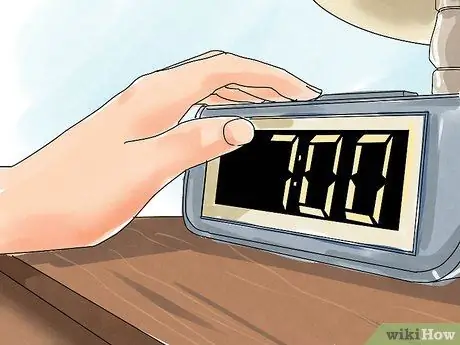
Step 5. Choose the right alarm
The alarm you choose should be loud enough to wake you, but not so loud that you startle yourself from a deep sleep. Or, you could try a wake-up clock with a light.
- If you've been getting enough sleep each day, there's usually no need for an alarm clock to wake you up on time.
- Cell phones are not a good alarm because the messages and emails you receive may be distracting.
- Try to avoid an alarm that emits blue light because it can interfere with sleep.
- If you set an alarm, try not to see it when you wake up at night. If you look at your clock a lot, turn it upside down so it's not facing you, move it across the room, or buy an alarm that has a sleep setting.
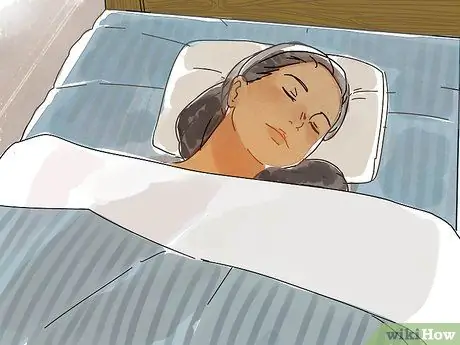
Step 6. Make sure you are comfortable
Choose mattresses and pillows that provide adequate support and comfort. If your mattress and pillows have been in use for a very long time, you may need to replace them.
Part 5 of 5: Overcoming Sleep Trouble

Step 1. Have a journal
If you're bedridden a lot, maybe a journal will help and you can put your thoughts into it before bed. Journals help organize and calm the mind.
Writing down your thoughts also helps you track what activities or life events seem to be blocking your sleep so you can make adjustments

Step 2. Use tricks to calm the mind
If you're having trouble sleeping because your mind is racing, focus on a tedious activity, such as counting down from 100. This will relax you and speed up your sleep.

Step 3. Get out of bed
If you wake up and can't get back to sleep, try getting out of bed and out of your room and doing something relaxing, like reading. It will make you sleepy again.
- Keep the lights dim so that the circadian rhythm is not disturbed.
- Stay away from cell phones, televisions, and other electronic devices.

Step 4. See a doctor
If you have trouble sleeping or wake up frequently at night, there may actually be a health problem causing it, so discuss any symptoms you are experiencing with your doctor.
If you are postmenopausal or nearing menopause, ask your doctor if your difficulty sleeping has to do with hormones

Step 5. Talk about the medications you are taking with your doctor
Many over-the-counter and prescription drugs can affect sleep. If you experience these side effects, your doctor may suggest changing your medication or reducing your dose.
Never stop taking medication before discussing it with your doctor
Tips
- Start with small changes to your routine. Turning off the television 30 minutes before bed is still better than nothing!
- Adhere to the changes you have made. In the end the change will become a habit, so there is no need to think about it.
- If you notice something else is interfering with your sleep, do something about it. For example, if your dog is always jumping into bed in the middle of the night, it may be time for him to sleep alone in the basket.






